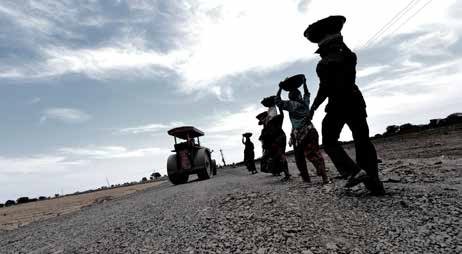
The importance of responsible business conduct in India by the corporate sector will help increase the focus on environmental protection-related strategic CSR projects within the purview of Schedule VII of the Companies Act 2013. – M.Rajendran
The pressing issues of climate change, rise in temperature, eco-degradation, water scarcity, and decreasing water levels are important to address to survive on planet Earth and secure a sustainable life for future generations.
Business Responsibility and Sustainability Reporting (BRSR) is a framework based on the nine National Guidelines for Responsible Business Conduct (NGRBC) principles. The BRSR framework is a mandatory disclosure mechanism for the top 1000 listed companies or businesses to report their performance in environmental, social, and governance (ESG) aspects and demonstrate their commitment to responsible business practices. The workshop also covered various topics such as CSR & ESG as tools for establishing responsible brands, effective BRSR disclosures, digital tools, IT portal/software for BRSR, and applying family-friendly policies in business. The workshop enabled the participants to enhance their knowledge and skills in BRSR and its implementation.
Further, in the realm of ESG (Environmental, Social, and Governance), capacity building of business stakeholders highlights its crucial role in shaping the future of our country.
New research co-authored by Wharton’s Aline Gatignon offers unprecedented insights into how various firms allocate Corporate Social Responsibility (CSR) funds across different dimensions. The study, titled “When Few Give to Many and Many Give to Few,” suggests that the USA can learn from India, the first country in the world to mandate CSR for certain qualified corporate companies and has attributes already contributing to the ESG.
Ministry of Corporate Affairs has made remarkable contributions by introducing the Corporate Social Responsibility (CSR) mandate under the Companies Act, the National Voluntary Guidelines on Social, Environmental and Economic Responsibilities of Business, and an updated version of the National Guidelines on Responsible Business Conduct (NGRBC). The Securities and Exchange Board of India (SEBI) has mandated Business Responsibility and Sustainability (BRSR) reporting on the top 1000 listed companies by market capitalization. The foundation of BRSR is inspired by the Ministry of Corporate Affairs’ Report on Business Responsibility Reporting (BRR) and National Guidelines on Responsible Business Conduct.
World Environment Day is the United Nation’s initiative to encourage worldwide awareness and action for the environment. Held annually since 1973, the Day has also become a vital platform for promoting progress on the environmental dimensions of the Sustainable Development Goals.
Major corporations, non-governmental organizations, communities, governments, and celebrities worldwide adopt the World Environment Daybrand to champion environmental causes. Corporate Environment Responsibility (CER) is a concept that suggests that it is the responsibility of the corporations/companies/departments operating within society to contribute towards economic, social and environmental development that creates a positive impact on society at large.

Sustainable development has many important facets/components, such as social, economic, environmental, etc., which are closely interrelated and mutually reinforcing.
The general structure of the EIA document prescribes inter-alia public consultation, social impact assessment, and R&R action plan, besides an environment management plan (EMP). Corporate Environmental Responsibility incorporates the infrastructure creation for drinking water supply, sanitation, health, education, skill development, roads, cross drains, electrification, including solar power, solid waste management facilities, scientific support and awareness to local farmers to increase yield of crop and fodder, rainwater harvesting, soil moisture conservation works, avenue plantation, plantations in community areas, etc.
The Ministry of Environment & Forest (MoEF) launched the Charter on “Corporate Responsibility for Environmental Protection (CREP)” in March 2003 to go beyond the compliance of regulatory norms for prevention & control of pollution through various measures, including waste minimization, in-plant process control & adoption of clean technologies.
The Charter set targets concerning the conservation of water energy, recovery of chemicals, reduction in pollution, elimination of toxic pollutants, and process & management of residues that must be disposed of in an environmentally sound manner. The Charter enlists the action points for pollution control for various categories of highly polluting industries. The Task Forces were constituted to monitor the progress of implementing CREP recommendations and action points.
Many corporations under the ESG and BRSR are aligning their CSR activities to meet the CREP Charter targets. An important component of corporate responsibility is environmental reporting, which describes the systematic and complete disclosure to the general public of a company’s, organization’s, or government’s environmental performance, encompassing its impacts on the environment and its actions to reduce adverse effects on ecosystems or restore environmental conditions.
Environment specialists in the industry and the government have suggested that CSR strategies must be customized to national characteristics rather than simply applying models that have proven successful elsewhere.
Public entities must identify national CSR priorities, build their instruments upon existing initiatives and capacities, and strategize implementation to involve all relevant actors. Their overarching goal should be to facilitate the integration of long-term thinking and sustainable solutions into core business strategies and thus improve environmental and social conditions.




















